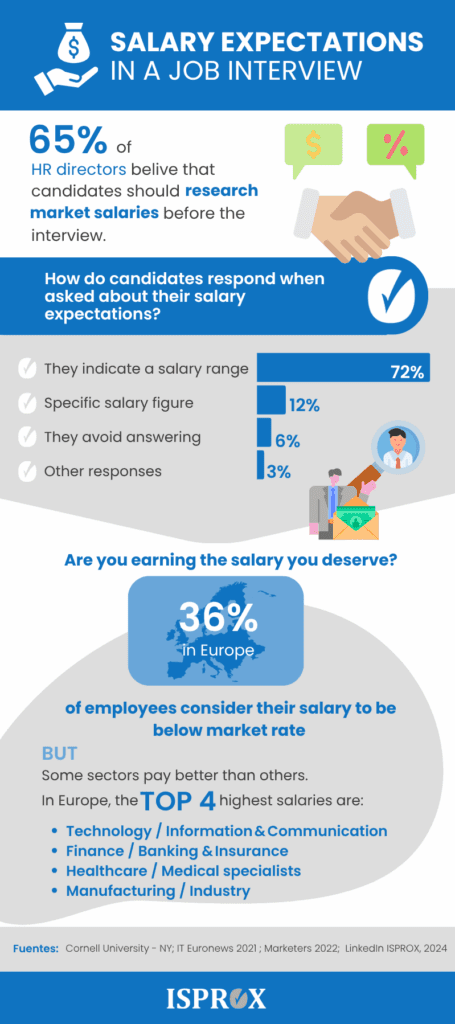Facing the question about your salary expectations during a job interview can be a critical and stressful moment. This question not only tests your ability to assess your own value accurately but also measures your knowledge of the market and your negotiation skills.
How can you make sure to respond effectively and get the salary you deserve? Discover in this article how to answer the question about your salary expectations in job interviews effectively, and we provide key tips to handle it confidently.
Content
Discussing your salary expectations during an interview can be one of the most delicate moments in the process. This question often causes concern, as the wrong answer can influence the employer's perception of your professional value. However, with the right preparation and a strategic approach, you can respond effectively and increase your chances of receiving a fair and competitive offer.
In this article, we will explore how to prepare for this question, what strategies to use to respond effectively, and how to avoid common mistakes. In addition, we will provide you with sample answers for different levels of experience and industries, as well as tips for subsequent salary negotiation. . Our goal is to offer you practical tools and useful advice that will allow you to face this question with confidence and professionalism.
Salary expectations refer to the salary you expect to earn in a new job. This figure is influenced by various factors, such as your level of experience, skills, the cost of living in your area, and market rates for the position you are seeking. Defining your salary expectations accurately and realistically is essential to ensure that both you and your future employer have a mutual understanding of the appropriate compensation for your position in the company.
Keep in mind that employers ask about your salary expectations for several reasons:
If you are looking for a job, we can help you find an opportunity that suits your profile and advise you on negotiating your salary.
Answering the question about your salary expectations can be a decisive moment in a job interview. Here are some tips to help you prepare and handle this situation with confidence.
We can start by telling you that it is essential to research market salaries for the position you are applying for.
In our experience, we can advise you to use:
Once you have an idea of the market salary, it is important to also consider other factors such as:
Being well prepared not only benefits you, but also shows employers that you are an informed and serious candidate.

When asked about your salary expectations in an interview, it is important to know how to respond by handling the situation strategically and professionally.
Here are some brief strategies that will be very useful to you:
According to Cornell University, 65% of HR managers believe that candidates should research market salaries before the interview. This shows that you are informed and have reasonable expectations.
After researching the average salaries for the position you are applying for, offer a range based on your experience and skills, to leave some leeway for the company and not close any doors. A little flexibility can help you get the opportunity you want sooner.
Before giving your answer, ask the interviewer what salary range the company has in mind. This allows you to understand their expectations and adjust yours accordingly.
It is very important to consider all aspects of the compensation package, not just the base salary. Mention that your expectations are flexible and depend on additional benefits and opportunities for growth.
With these strategies, you will be able to handle the interview without compromising your negotiating power or diminishing your value.
Answering the question about your salary expectations may vary depending on your level of experience and the sector in which you work. Here are some examples of effective responses for different situations, always maintaining a professional and friendly tone.
For those starting their careers and with little experience:
“Considering the starting salaries in this field and my education and skills, I believe that a range between (X) and (X) would be appropriate. I am open to discussing the growth opportunities and benefits offered by the company.”
For professionals with several years of experience in their sector:
With my five years of experience in digital marketing, and after researching salaries for similar roles, I believe that a range between (X) and (X) would be fair. I am open to discussing this figure and other additional benefits.
In high-demand sectors, such as technology or finance:
With my seven years of experience in software development and my specialization in artificial intelligence, I have found that the normal salary range is between (X) and (X)....
For senior positions:
With over 10 years of experience in leadership roles in the financial sector, and managing projects that increased profitability by 20%, I believe that a range between (X) and (X) would be appropriate.
These examples will help you respond effectively and professionally, adapting to your specific situation.
It is important to keep in mind that discussing salary expectations during an interview can be a sensitive topic. Here are some common mistakes and tips on how to avoid them.
1. One of the most common mistakes is not researching market salaries before the interview.
This could be avoided by researching the salary ranges for the position you are applying for, keeping in mind the strategies we discussed earlier.
2. A common mistake is to give an exact figure. According to a survey conducted by the University of Mannheim in Germany, 70% of HR managers prefer candidates to provide a salary range rather than a specific figure, as this shows a willingness to negotiate and flexibility.
Therefore, the best strategy is to have a salary range: “I am looking for a salary in the range of (X) to (X)...”
3. Another common mistake is being inconsistent with your salary expectations during the different stages of the selection process. For example, if during an initial phone interview you indicate a salary range and then in a second face-to-face interview they ask you again about your salary expectations and you indicate a different range, you will generate mistrust in the employer.
It is important to indicate the same figures in your salary expectations throughout the selection process to increase your chances of being selected for the position.
4. A huge mistake is to respond in an insecure or hesitant manner, as this can give a negative impression and affect your ability to negotiate.
To avoid this, it is best to practice your response and deliver it with confidence.
Answering the question about your salary expectations is just the beginning. If your answer opens up a negotiation, it is important to know how to proceed to ensure a favorable agreement.
According to a study by the University of Buenos Aires, 60% of HR managers believe that the ability to negotiate after responding to salary expectations is crucial for assessing a candidate's adaptability and communication skills.
Once you have shared your salary expectations and the company shows interest in negotiating, you should consider the following:
It is important to note that salary negotiation requires a balance between firmness and flexibility. Here are some tips for managing both aspects:
This can help build a strong relationship with your future employers and facilitate a mutually beneficial agreement.
In conclusion, addressing salary expectations during an interview requires preparation, strategy, and flexibility. It is essential to research market salaries, consider your skills and experience, and present your expectations clearly and realistically.
During the negotiation, listen carefully, evaluate the entire offer, and maintain a firm but flexible stance depending on the context. Remember that salary negotiation is an opportunity to demonstrate your value and ensure fair and competitive compensation.
With confidence and professionalism, you can meet this challenge and achieve a satisfactory outcome for both parties.
Are you looking for a new job challenge?
Register your CV, and from ISPROX, we will contact you if any vacancy matches your profile.






Essential for basic site functionality and security. Always active.
Guardan tus ajustes como idioma o región.
Help us understand how you use the site (e.g., Google Analytics).
Allow personalized advertising and measure effectiveness (e.g., Meta/Ads).